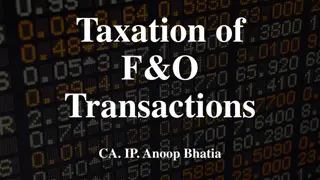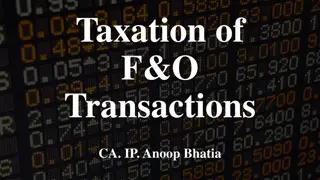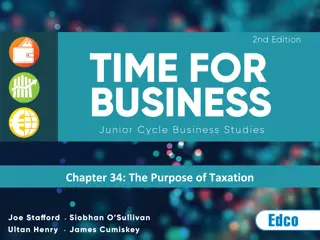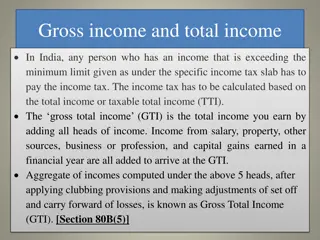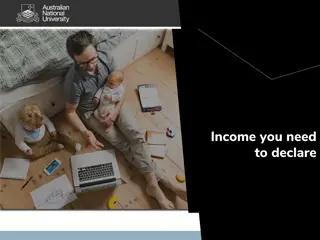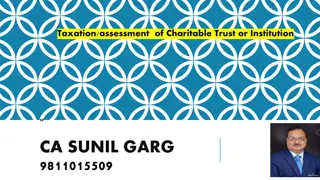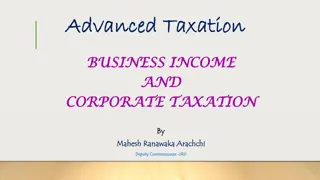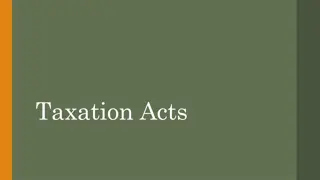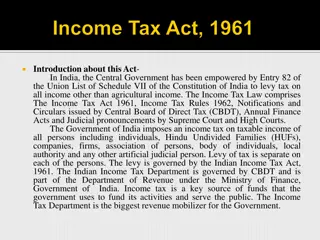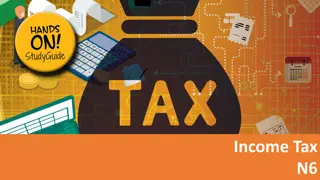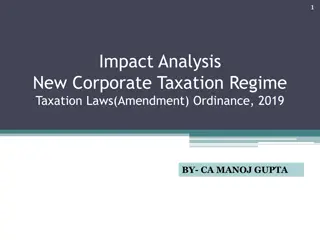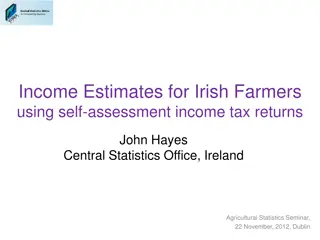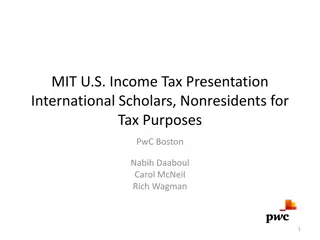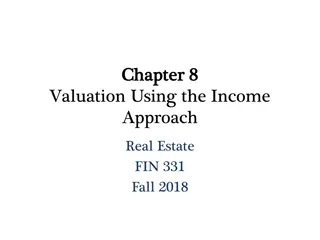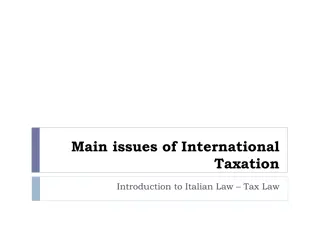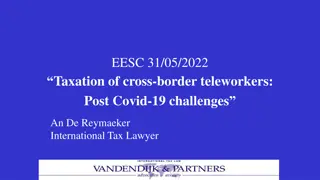Understanding Clubbing of Income in Taxation
Clubbing of income refers to including another person's income in the taxpayer's total income to prevent tax avoidance practices like transferring assets to family members. This concept is addressed in sections 60 to 64 of the Income Tax Act. Key terms include transferor, transferee, revocable transfer, and minor. Different circumstances trigger clubbing of income, such as transfer of income without assets, revocable transfer of assets, and income of individuals like spouses and minor children. Examples and conditions under sections 60 and 61 are provided to illustrate this concept.
Download Presentation

Please find below an Image/Link to download the presentation.
The content on the website is provided AS IS for your information and personal use only. It may not be sold, licensed, or shared on other websites without obtaining consent from the author. Download presentation by click this link. If you encounter any issues during the download, it is possible that the publisher has removed the file from their server.
E N D
Presentation Transcript
LAW OF TAXATION MODULE 2 CLUBBING OF INCOME
WHAT IS CLUBBING OF INCOME? Clubbing of income means Income of other person included in assessee s total income, for example: Income of husband which is shown to be the income of his wife is clubbed in the income of Husband and is taxable in the hands of the husband. ORIGIN OF THIS CONCEPT: Earlier the taxpayers made an attempt to reduce their tax liability by transferring their assets in favour of their family members or by arranging their sources of income in such a way that tax incidence falls on others, whereas benefits of income is derived by them. So to counteract such practices of tax avoidance, necessary provisions have been incorporated in sections 60 to 64 of the Income Tax Act Hence, a person is liable to pay tax on his own income as well as income belonging to others on fulfillment of certain conditions.
TERMS TO REMEMBER Transferor- The person who transfers any of his belongings, specifically his assets/income to another person is known as Transferor. Transferee-The person to whom the transferor transfers his / her assets is known as transferee. Revocable- The right to reacquire or take back anything legally which was given earlier under an agreement or settlement. Minor- A person who is below the age at which he or she legally becomes an adult. In India at present a person becomes adult at the age of 18 years.
The Following are the circumstances where the income of the other person is included in the income of the assesse: Transfer of income without the transfer of asset (Sec 60). Revocable transfer of assets (sec 61) Irrevocable transfer of assets for a specified period (sec 62) Transfer and revocable transfer defined. (Sec 63) Income of an individual to include income of spouse, minor child etc. (Sec 64)
CLUBBING OF INCOME FOR TRANSFER OF INCOME WITHOUT TRANSFER OF ASSET (SEC. 60) Section 60 is applicable if the following conditions are satisfied: The taxpayer owns an asset The ownership of asset is not transferred by him. The income from the asset is transferred to any person under a settlement, or agreement. If the above conditions are satisfied, the income from the asset would be taxable in the hands of the transferor. EXAMPLE: Amitabh Bachan owns Debentures worth Rs 1,000,000 of ABC Ltd., (annual) interest being Rs. 100,000. On April 1, 2018 he transfers interest income to Shahrukh Khan, his friend without transferring the ownership of these debentures. Although during 2018-19, interest of Rs. 100,000 is received by Shahrukh Khan, it is taxable in the hands of Amitabh Bachan as per Section 60.
CLUBBING OF INCOME FOR REVOCABLE TRANSFER OF ASSETS (SEC 61) Revocable transfer,means the transferor of asset assumes a right to re-acquire asset or income from such an asset, either whole or in parts at any time in future, during the lifetime of transferee. It also includes a transfer which gives a right to re-assume power of the income from asset or asset during the lifetime of transferee. If the following conditions are satisfied section 61 will become applicable. An asset is transferred under a revocable transfer , The transfer for this purpose includes any settlement, or agreement Then any income from such an asset is taxable in the hands of the transferor and not the transferee.
In any of the following cases, transfer is treated as revocable transfer 1. If an asset is transferred under a trust and it is revocable during the lifetime of the beneficiary. EXAMPLE: X transfers a house property to a trust for the benefit of A&B. However, X has a right to revoke the trust during the lifetime of A and/or B. Its is revocable transfer and income arising from the house property is taxable in the hands of X 2. If an asset is transferred to a person and it is revocable during the lifetime of transferee. EXAMPLE: X transfer a house property to A. However , X has a right to revoke the transfer during the lifetime of A. it is a revocable transfer and income arising from the house property is taxable in the hands of X. 3. If the transfer contains any provision to re-transfer the asset(or income therefrom) to the transferor directly or indirectly, wholly or partly. 4. If the transferor has any right to reassume power over the asset (or income therefrom) directly or indirectly, wholly or partly. EXAMPLE: X transfers an asset. Under the terms of transfer, he has a right to use the asset for the personal benefits of his family members whenever he wants. Till date, he has not exercised the right. It is revocable transfer. The entire income from the asset would be taxable in the hands of X.
The following conclusions can be drawn- There is asset which is transferred under a revocable transfer . Income from the aforesaid asset is taxable in the hands of transferor. Such income is taxable as and when the power to revoke arises. The above rule is applicable even if the power to revoke has not been exercised so far.
REVOCABLE TRANSFER OF ASSETS FOR SPECIFIED PERIOD (SEC 62) As per Section 62(1), the provisions of revocable transfer as discussed in Section 61 are not applicable in the following cases:- Where income arises to any person by the virtue of transfer by way of trust, which is not revocable during the lifetime of the beneficiary. Where income arises to any person by any other way which is not revocable during the lifetime of the transferee. Where income arises to any person by way of transfer made before 1.4.1986, which is not revocable for a period of 6 years or more. provided that the transferor derives no direct or indirect benefit from such income in any case. However, incomes will be chargeable to tax as the income of the transferor as and when the power to revoke the transfer comes into play.
INCOME FROM ASSETS TO SPOUSE [SEC. 64(1)(IV)] Where an asset (other than House Property) is transferred by an individual to his or her spouse directly or indirectly otherwise than for adequate consideration or in connection with an agreement to live apart any income from such asset will be deemed to be the income of transferor.
Where an asset (other than House Property) is transferred by an individual to his or her spouse directly or indirectly otherwise than for adequate consideration or in connection with an agreement to live apart any income from such asset will be deemed to be the income of transferor.
However, this section is not applicable in the following cases (a) if assets are transferred before marriage. (b) if assets are transferred for adequate consideration. (c) if assets are transferred in connection with an agreement to live apart. (d) if on the date of accrual of income, the transferee is not spouse of the transferor. (e) if property is transferred by the Karta of HUF, gifting co-parcenary property to his wife. (f) the property is acquired by the spouse out of the pin money (i.e., an allowance given to the wife by her husband for her dress and usual household expenses).
INCOME FROM ASSETS TRANSFERRED TO ANY PERSON FOR THE BENEFIT OF SON S WIFE [SEC 64(1) (VII)] Where an asset is transferred to any other person or association of persons, without adequate consideration for the benefit of Son s wife of the individual as well as for some other persons, income on such asset to the extent of benefit which accrues to the Son s Wife, shall be included in the total income of the individual.
CLUBBING OF INCOME OF MINOR CHILD [SEC 64(1A)]. In computing the total income of an individual, there shall be included all such income as arises or accrues to his minor child. The income shall be clubbed in the hands of the parents whose total income excluding the income of the minor child is greater. And if the marriage of his parents does not subsist, the income shall be clubbed in the hands of that person who maintains the minor child in the previous year. Where any income is once included in the total income of either parent, any such income arising in any succeeding years shall be included in the income of the same parent unless Assessing officer is satisfied that it should be clubbed with the other parent.
Further, a deduction up to Rs. 1500 per minor shall be allowed against such income which is clubbed in the hands of the parent. However, the following income of a minor shall not be clubbed and will be taxed in the hands of the minor himself. Manual work done by him Activity involving application skill, talent or specialized knowledge or experience. Any income of minor child suffering form disability of the nature specified in section 80U like physical disability, blindness etc




